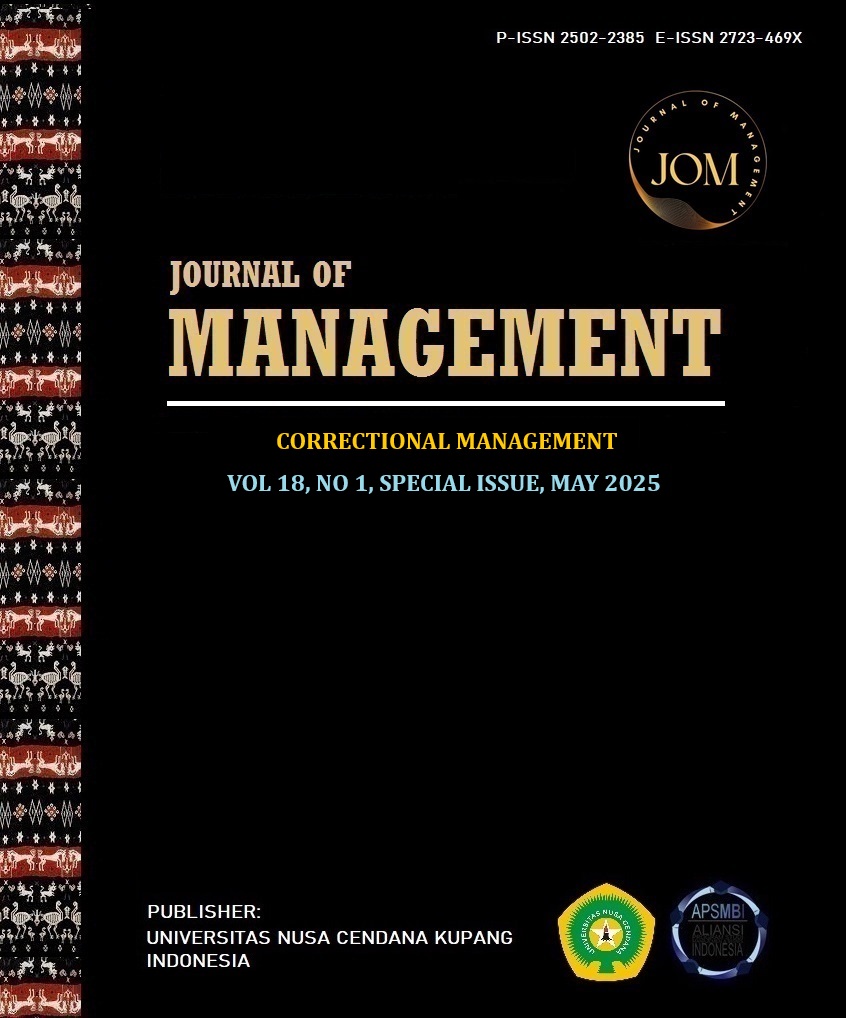COMMUNICATION STRATEGY OF CORRECTIONAL GUARDIANS IN SHAPING THE SELF-CONCEPT OF CHILD PRISONERS AT LPKA CLASS I TANGERANG
Abstract
The purpose of this study was to determine the communication strategy of correctional guardians in shaping the self-concept of child prisoners and to find out the factors that cause negative self-concept in child prisoners while undergoing coaching at the Tangerang Class I Child Special Development Institution. This research uses qualitative research methods with a phenomenological approach. This study concludes that the correctional guardian, in developing a communication strategy, uses the stages of knowing the audience, compiling messages, determining methods, and using media. However, in its implementation, improvement efforts are needed so that the formation of a positive self-concept in child prisoners becomes more optimal. The factors that form the negative self-concept of child prisoners while undergoing coaching are social stigma, lack of closeness with parents, lack of access to psychological support, and not forming warm and personal communication and connections with correctional guardians. It is recommended that the Special Development Institute for Children Class I, Tangerang, in this case, can carry out special training for correctional guardians in communicating effectively with child prisoners.
Keywords : Communication Strategy; Self-Concept; Child Prisoners; Correctional Guardians
Downloads
References
Ernawati, M., Anwar, R., Nurhadi, H., & Nuriana, D. (2024). Penegakan Disiplin Positif Sebagai Upaya Meminimalisir Hukuman Fisik dan Non Fisik. Jurnal Ilmiah Wahana Pendidikan, 10(16), 286–296.
Gunawan, C., Nasichah, & Firdaus, A. B. (2023). Peran Komunikasi Intrapersonal dalam Meningkatkan Motivasi Diri Mahasiswa UIN Syarif Hidayatullah Jakarta. Harmoni : Jurnal Ilmu Komunikasi Dan Sosia, 1(3), 78–85.
Hestiyana, N., Rahmayani, D., & Imbran, A. R. (2017). Hubungan Konsep Diri dengan Perilaku Hygiene Organ Reproduksi Remaja Putri SMAN-10 Banjarmasin. Diinamika Kesehatan, 8(1), 274–284.
Marhayati, N. (2013). Dampak Hukuman Fisik terhadap Perilaku Delinkuen Remaja. Lentera Pendidikan, 16(1), 112–124.
Maslihah, S. (2017). Faktor yang Mempengaruhi Kesejahteraan Subyektif Anak Didik Lembaga Pembinaan Khusus Anak. Jurnal Psikologi Insight, 1(1), 82–94.
Riauan, M. A. I., & Sari, G. G. (2018). Konsep Diri Perokok Di Universitas Islam Riau. Medium : Jurnal Ilmiah Fakultas Ilmu Komunikasi Universitas Islam Riau, 6(2), 27–38.
Simanjuntak, F. N., Boiliu E, N. I., Tyas, H., Samosir, P. S. J. K. O., Limbong, P. S. J. K. O., Damayanti, M. M. A., Leniwita, M. M. A., Polii, I. V. R. S. D., Widora, I. V. R. S. D., & Novitasari, D. T. I. (2020). Tantangan dan Peluang Indonesia dalam Bidang Sosial dan Sains pada Era Revolusi Industri 4.0. In Uki Untuk Negeri. UKI Press.
Sitompul, M. (2015). Pengaruh Efektivitas Komunikasi Antarpribadi Pengurus Panti Asuhan Terhadap Pembentukan Konsep Diri Anak-Anak Panti Asuhan Aljamyatul Washliyah Medan. Jurnal Simbolika, 1(2), 176–188.
Stephany, A. A., Sugandi, & Ghufron. (2019). Strategi Komunikasi dalam mensosialisasikan Alternatif Pangan Oleh Dinas Pangan, Tanaman Pangan, Holtikultural Provinsi Kaltim Di Kota Samarinda. EJournal Ilmu Komunikasi, 7(3), 155–169.
Sugoto, M. C., H, A. D., & Cahyadi, J. (2011). Kajian Iklan Layanan Masyarakat Tentang Pentingnya Mengucapkan Terima Kasih Bagi Para Remaja Di Surabaya. Jurnal Desain Komunikasi Visual Nirmana, 11(2), 106–113.
Suheri. (2018). Makna Interaksi dalam Komunikasi (Teori Interaksi Simbolik Dan Teori Konvergensi Simbolik). Al-Hikmah Media Dakwah, Komunikasi, Sosial Dan Kebudayaan, 9(2), 52–63. https://doi.org/10.32505/hikmah.v9i2.1739
Wahyuni, A. S. (2021). Hubungan Konsep Diri dengan Kecemasan pada Anak Binaan di LPKA Tanjung Pati. Jurnal Pendidikan Tambusai, 5(1), 61–68.

 Dimas Mukhtar(1*)
Dimas Mukhtar(1*)



